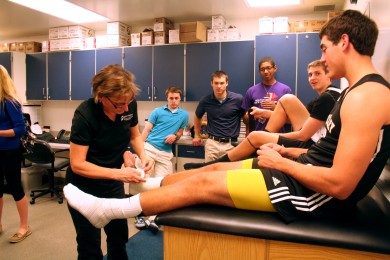A line of students stretches down the hallway, waiting for the athletic training room’s door to open. From basketball players waiting to be taped, to wrestlers needing ice, athletic trainer Roberta Kuechler attends to it all.
Kuechler said by the time she was a sophomore in high school, she knew she wanted to help athletes as her profession.
“I injured my knee playing basketball, but I didn’t want to miss any of the season,” she said. “It was really swollen, but in ten days it went down, so I went back to play.”
It wasn’t until her senior year she learned she had torn her Anterior Cruciate Ligament (ACL).
“I ended up having surgery in the spring of my senior year,” she said. “I thought it was fixed, but found out later that they just took out the broken parts.”
Kuechler’s injury motivated her to help other athletes in similar situations.
“Because no one really knew how to take care of my knee, I decided that I wanted to help athletes like myself that really wanted to play,” she said. “Somebody needed to know what to do for them.”
Originally unaware of athletic training, Kuechler said she decided to study physical therapy.
“At that time, [physical therapy] was the closest profession I knew about that would educate me about the human body and how it works to get athletes better,” she said.
Regardless of her ACL, Kuechler received a scholarship to Saint Louis University (SLU) for field hockey.
Kuechler said she was introduced to the sport by her older sisters.
Kuechler played at SLU for two years and helped her team win fifth place at Nationals her sophomore year.
Kuechler said her coach, a former player for the Dutch National Team, helped her to be the best.
“He had talked to me about be able to play even after college — possibly Olympic level,” she said. “It was always a dream of mine to play in the Olympics.”
During her second year of college, she had acquired all of her general education requirements but didn’t have a major.
“I started researching professions that would help athletes,” Kuechler said. “I then discovered Athletic Training.”
After this, she transferred to Western Illinois University and changed majors.
Kuechler graduated with a degree in Physical Education K-12 and a minor in Athletic Training.
Immediately after graduation, she went to work at Wheaton College in Illinois.
With little professional experience, she said she wit- nessed one of her most gruesome injuries right off the bat.
“I was working men’s basketball, and our point guard dislocated his ankle,” she said. “They were carrying him off in the Fireman’s carry, so when they walked past me, his shoe was facing sideways instead of facing down. It looked liked his shoe was stuck on the left side of his leg.”
Kuechler said she cares for multiple injuries, but concussions are the most difficult injuries to treat.
“Concussions are the most difficult and time consuming injury, primarily because every person is going to respond differently,” she said. “It’s critical you care for it properly. You have to communicate with both parents about what is happening. They may or may not understand, so there is a lot of education involved. They look fine on the outside, but they are really struggling inside because their brain isn’t really processing. It is so frustrating for the athlete going through that.”
Junior basketball player Will Cook was recently cleared to play after recovering from a minor concussion.
“I got [my concussion] playing basketball during try- outs,” he said. “I went for a loose ball, and I knocked heads with another player.”
Cook said he wasn’t allowed to practice for a week and a half.
“I had to take the written test — ‘My Symptoms Test’,” he said. “If I was feeling dizzy, I would rate it on a scale zero to five. I wasn’t allowed practice until all of my [results] were at zero.”
Kuechler said she treats muscle and bone injuries, as well.
“I can help people feel better with all the other injuries, but with concussions I can’t do anything,” she said. “It frustrates me when I see people really struggling, and I can’t do anything about it.”
Kuechler said, though some injuries are difficult to face, her main focus is always on the patient.
“I have never been grossed out by blood [or injuries],” she said. “My job is to care for that person. I would be not concerned about how I am feeling because that is not what I look at. I am looking at that individual and caring for that individual. While it’s happening, you kick into a certain mind set and you’re not concerned about looking and thinking about how gross something is, it just doesn’t enter your mind.”
Senior Tyler Randall broke his hip during his sophomore year while running at a track practice.
He said Kuechler helped him overcome this difficult situation.
“The one thing I really like about [Kuechler] is the fact that she stays longer than she really needs to,” he said. “She is supposed to clock out a certain time, but she always stays hours past that until the last person leaves just to make sure everyone gets help that needs help. She goes beyond what she has to do to make sure everyone is healthy.”
Kuechler said by the time she was a sophomore in high school, she knew she wanted to help athletes as her profession.
“I injured my knee playing basketball, but I didn’t want to miss any of the season,” she said. “It was really swollen, but in ten days it went down, so I went back to play.”
It wasn’t until her senior year she learned she had torn her Anterior Cruciate Ligament (ACL).
“I ended up having surgery in the spring of my senior year,” she said. “I thought it was fixed, but found out later that they just took out the broken parts.”
Kuechler’s injury motivated her to help other athletes in similar situations.
“Because no one really knew how to take care of my knee, I decided that I wanted to help athletes like myself that really wanted to play,” she said. “Somebody needed to know what to do for them.”
Originally unaware of athletic training, Kuechler said she decided to study physical therapy.
“At that time, [physical therapy] was the closest profession I knew about that would educate me about the human body and how it works to get athletes better,” she said.
Regardless of her ACL, Kuechler received a scholarship to Saint Louis University (SLU) for field hockey.
Kuechler said she was introduced to the sport by her older sisters.
Kuechler played at SLU for two years and helped her team win fifth place at Nationals her sophomore year.
Kuechler said her coach, a former player for the Dutch National Team, helped her to be the best.
“He had talked to me about be able to play even after college — possibly Olympic level,” she said. “It was always a dream of mine to play in the Olympics.”
During her second year of college, she had acquired all of her general education requirements but didn’t have a major.
“I started researching professions that would help athletes,” Kuechler said. “I then discovered Athletic Training.”
After this, she transferred to Western Illinois University and changed majors.
Kuechler graduated with a degree in Physical Education K-12 and a minor in Athletic Training.
Immediately after graduation, she went to work at Wheaton College in Illinois.
With little professional experience, she said she wit- nessed one of her most gruesome injuries right off the bat.
“I was working men’s basketball, and our point guard dislocated his ankle,” she said. “They were carrying him off in the Fireman’s carry, so when they walked past me, his shoe was facing sideways instead of facing down. It looked liked his shoe was stuck on the left side of his leg.”
Kuechler said she cares for multiple injuries, but concussions are the most difficult injuries to treat.
“Concussions are the most difficult and time consuming injury, primarily because every person is going to respond differently,” she said. “It’s critical you care for it properly. You have to communicate with both parents about what is happening. They may or may not understand, so there is a lot of education involved. They look fine on the outside, but they are really struggling inside because their brain isn’t really processing. It is so frustrating for the athlete going through that.”
Junior basketball player Will Cook was recently cleared to play after recovering from a minor concussion.
“I got [my concussion] playing basketball during try- outs,” he said. “I went for a loose ball, and I knocked heads with another player.”
Cook said he wasn’t allowed to practice for a week and a half.
“I had to take the written test — ‘My Symptoms Test’,” he said. “If I was feeling dizzy, I would rate it on a scale zero to five. I wasn’t allowed practice until all of my [results] were at zero.”
Kuechler said she treats muscle and bone injuries, as well.
“I can help people feel better with all the other injuries, but with concussions I can’t do anything,” she said. “It frustrates me when I see people really struggling, and I can’t do anything about it.”
Kuechler said, though some injuries are difficult to face, her main focus is always on the patient.
“I have never been grossed out by blood [or injuries],” she said. “My job is to care for that person. I would be not concerned about how I am feeling because that is not what I look at. I am looking at that individual and caring for that individual. While it’s happening, you kick into a certain mind set and you’re not concerned about looking and thinking about how gross something is, it just doesn’t enter your mind.”
Senior Tyler Randall broke his hip during his sophomore year while running at a track practice.
He said Kuechler helped him overcome this difficult situation.
“The one thing I really like about [Kuechler] is the fact that she stays longer than she really needs to,” he said. “She is supposed to clock out a certain time, but she always stays hours past that until the last person leaves just to make sure everyone gets help that needs help. She goes beyond what she has to do to make sure everyone is healthy.”





